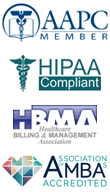Auditing & Compliance
Why Audit?
A study in 2020 revealed that a striking 86% of claim denials have the potential to be prevented. Considering that denials represent a substantial source of revenue depletion, it is imperative for provider organizations to proactively address this issue. To achieve this, Revenue Cycle Rx can pinpoint where and why these avoidable problems are surfacing within the revenue cycle. One effective approach to gaining these insights is through a comprehensive audit of your revenue cycle processes. An audit can identify inefficiencies in processes, eliminate redundancies, and detect common coding and billing errors. It also evaluates staffing levels and determines whether additional education and training are required for the staff. Furthermore, an audit can identify issues within electronic health records and enhance communication between coding and clinical documentation improvement (CDI) teams. Additionally, it has the potential to uncover and mitigate instances of fraud and improper payments while ensuring compliance with HIPAA regulations. In summary, an audit serves as a valuable tool for healthcare teams to enhance service quality, reduce claim denials, and lower operational costs.
Compliance and Security
This entails verifying that your Revenue Cycle Management (RCM) process aligns with applicable laws, regulations, and standards while also safeguarding RCM data and systems against unauthorized access or improper use. A comprehensive assessment of this aspect can help prevent potential penalties, fines, or legal actions, preserving your reputation and trustworthiness. We can assess your compliance program and policies, staff training and awareness, data privacy and security measures, and preparedness and response plans for audits.
Comprehending HIPAA Regulations
HIPAA (Health Insurance Portability and Accountability Act) is divided into five titles, each addressing various aspects of healthcare delivery and patient privacy. Title II of HIPAA, known as the Administrative Simplification (AS) provisions, outlines national standards for electronic healthcare transactions and data security. The AS provisions aim to enhance healthcare delivery efficiency while safeguarding the privacy and security of patient health information (PHI).
The Significance of a HIPAA Compliance Plan The HIPAA Security Rule, established in 2001, is designed to safeguard electronically protected health information. It was enacted in response to congressional concerns regarding health coverage portability and continuity. HIPAA mandates standardized formats for electronic data transmission among healthcare providers, clearinghouses, and plans. These standardized transactions seek to reduce administrative costs, necessitating that medical practices strengthen their RCM processes.
A HIPAA compliance plan ensures the security and protection of PHI against potential breaches through physical, technical, and administrative safeguards. It holds providers and staff members accountable for PHI protection and outlines the consequences of breaches or policy violations. By establishing a HIPAA compliance plan, organizations can mitigate and manage breaches when they occur, thereby reducing future risks and vulnerabilities. Such proactive measures save organizations money by implementing necessary safeguards and identifying potential threats and vulnerabilities, ultimately leading to more accurate diagnoses and improved provider-patient relationships. Patients’ trust in an organization is fostered when their information is safeguarded.
Compliance Strategies for Revenue Cycle Management
RCM encompasses the management of patient financial information, including insurance claims, billing, and other administrative tasks. To maintain compliance with HIPAA regulations in RCM, Revenue Cycle Rx can help implement the following strategies:
Patient Scheduling and PHI Storage: In the RCM process, patient scheduling is the initial step where medical practices gather crucial patient information. It is essential to ensure that any PHI is collected and stored appropriately. HIPAA regulations require medical facilities to identify the assets and information systems involved in the creation, receipt, transmission, or maintenance of Protected Health Information. It is necessary to catalog any hardware used to store or share PHI, as mandated by the law. Medical practices should regularly install and update hardware and software firewalls to maintain HIPAA compliance in the RCM process. Data encryption is also critical for securing information, including billing, case management, laboratory and clinical data, patient reports and transcripts, and emails between patients and healthcare providers.
Development of Policies and Procedures: HIPAA regulations mandate covered entities to create and implement policies and procedures that ensure compliance with its rules. Revenue cycle management (RCM) presents specific risks to patient privacy and data security. Hence, it is essential to establish policies and procedures that address RCM-specific risks, such as data breaches, unauthorized access, and employee training.
Monitoring Activity: Activity monitoring is essential to maintaining HIPAA compliance in revenue cycle management. A monitoring program involves implementing tools and processes to track and analyze activity related to electronic patient health information (ePHI). This monitoring aims to detect and respond to unauthorized access or use of ePHI, identifying and preventing security incidents that could compromise the confidentiality, integrity, and availability of ePHI. Regular log reviews and audits should be conducted to ensure that access controls are adequate and that there are no unauthorized attempts to access or use ePHI.
Accurate Medical Documentation: After patient scheduling, accurate medical documentation is crucial to ensure RCM efficiency. Maintaining clear and detailed patient files is essential for effective revenue cycle management. Inadequate documentation may lead to doubts about services rendered and payments received, compromising the RCM process. Practices should establish written documentation standards to ensure compliance with HIPAA regulations and to prevent missing information.
Conducting a Risk Assessment: A risk assessment is a critical first step in identifying potential vulnerabilities in your RCM processes. It helps identify areas where PHI could be compromised and prioritize remediation efforts. After establishing documentation standards, practices should conduct a risk assessment of their policies and procedures. The risk assessment aims to determine if the measures in place are reasonable and appropriate to protect PHI against anticipated threats or hazards to confidentiality, integrity, and availability. A thorough risk assessment can help practices identify potential vulnerabilities and take necessary steps to strengthen data security measures.
Employee Training: HIPAA regulations require covered entities to ensure that employees handling patient financial information receive training on HIPAA regulations. This training should cover various topics, including the significance of patient privacy, the types of PHI protected under HIPAA, employees’ role in safeguarding PHI, and the consequences of non-compliance. Training should be ongoing and include regular updates to ensure employees are aware of changes to HIPAA regulations. For example, if updates occur in the HIPAA Privacy Rule, employees should be trained to ensure they are aware of new requirements or changes. Training should be tailored to each employee’s specific roles and responsibilities and include scenarios and examples relevant to their work.
Preventing Revenue Loss: Establishing additional standards to prevent revenue loss is essential. Denied claims and unpaid bills can result in significant revenue loss and negatively impact customer satisfaction. Effective claim management practices can help reduce the number of denied claims, improve revenue cycle management, and enhance customer satisfaction.
Regular Compliance Checks: Simply having processes in place is insufficient for a practice to maintain HIPAA compliance in its RCM. Regular checks are necessary to ensure ongoing compliance with HIPAA standards. Failing to stay updated with HIPAA changes can suddenly render a practice non-compliant, leading to penalties. In cases of non-compliance with HIPAA regulations, fines can be significant, with penalties potentially reaching up to $1.5 million per year, and in some cases, criminal charges, including imprisonment. Fines can be categorized as either Reasonable Cause or Willful Neglect, with Reasonable Cause fines ranging from $100 to $50,000 per incident. Willful Neglect fines can lead to criminal charges and jail time.
Conclusion
HIPAA regulations are intricate and challenging to navigate, particularly for RCM providers. Nevertheless, it is essential to protect patient privacy and data security. HIPAA compliance plans ensure the protection of PHI and prevent violations of HIPAA policies and procedures that could put patients and organizations at risk. By implementing these recommended practices, organizations can establish a trustworthy HIPAA compliance plan that adheres to federal and state privacy and security requirements.

